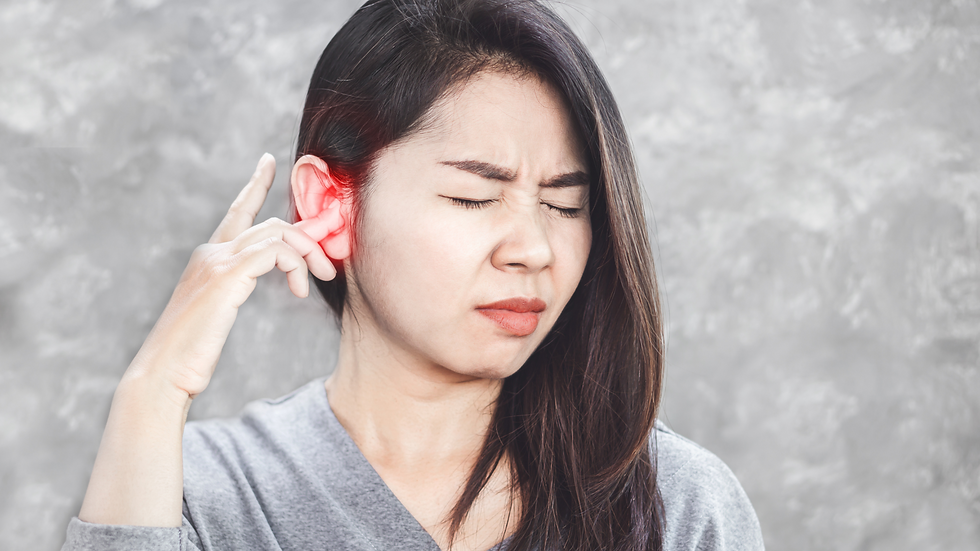Is It Swimmer's Ear? Explore Causes, Symptoms, Treatment and Prevention
- Victoria Wermers, RN,MSN,FNP, PMHNP
- Sep 18, 2024
- 4 min read
Updated: Jun 30, 2025
Otitis Externa - Swimmer's Ear
Ask yourself: Is It Swimmer's Ear? Explore Causes, Symptoms, Treatment and Prevention
Causes-
It's that time of year again. People are swimming. People with otitis externa - an infection of the ear canal - "otitis externa" or "swimmer's ear" - begin storming the clinics with ear pain. The infection typically infects the area between the eardrum and the opening of the outer ear. Most are caused by bacteria entering the ear canal (about 10% of cases are fungal, and chronic otitis externa may be due to a fungal infection). It can be from swimming in contaminated freshwater lakes or pools. At the start of summer, many people come in with ear infections after swimming in swimming pools: The pH level of the water hasn’t yet stabilized, meaning it’s not at the optimal range to effectively kill bacteria and algae—these microorganisms can linger and potentially lead to infections like otitis media.

In most cases—and this is a helpful clue for diagnosing swimmer’s ear—you can often identify an outer ear infection by gently pulling on the top of the outer ear, known as the pinna. If that causes pain, it’s typically a sign of swimmer’s ear. Besides looking in the ear with an otoscope, we use this maneuver to help make our diagnosis.

But it's not always from swimming. The surface of the ear canal can get infected when a foreign substance is introduced into the ear canal, like bacteria from the water, foreign objects (like earbuds and bobby pins), or dirty fingers, and you know about Q-tips - they are for your outer ear.
While Q-Tips can help clean the outer ear, putting them too far in your ear can cause otitis externa. They scratch the tender surface of the ear canal and push earwax even deeper (I have even seen the cotton from the tip of a Q-Tip get stuck deep in someone's ear)! Sometimes, excessive earwax alone can cause an ear infection like this (see below). Occasionally, a person will develop otitis externa from a skin lesion (like a pimple or minor scratch) in the ear canal, which will also cause infection. These infections cause a lot of swelling, inflammation, and pain in the canal, often radiating to the outer ear. Sometimes, there is also drainage from the canal.
Treatment and Relief for Swimmer's Ear
Over-the-Counter Medicines (OTC) for Swimmer's Ear Pain
When you have ear pain, if it's not too bad, you might try some over-the-counter treatments:
Try ibuprofen (common: Advil, Motrin) - as directed - it's a pretty decent anti-inflammatory.
Acetaminophen (common: Tylenol) - As directed over the counter for pain.
There are lots of brands of ear drops for swimmer's ear to use after swimming. Most contain acetic acid and hydrogen peroxide (or rubbing alcohol), which have drying and antimicrobial/antifungal properties. They not only help treat but are also preventive if used after swimming.
Numerous oils are available to treat ear infections (for example, one brand that patients tell me about is Hyland's ear drops, a homeopathic preparation primarily containing herbs such as chamomile, lycopodium, pulsatilla, sulfur, and belladonna). Ear drops are not absorbed systemically, so they typically do not cause side effects in other areas of your body.
Reminder: Always read the instructions and warnings.
Natural Remedies for Swimmer's Ear
Half acetic acid (white vinegar ) and half hydrogen peroxide or rubbing alcohol. This may help treat and prevent swimmers' ear and fungal ear infections.
OILS (be sure your essential oils are mixed with a carrier oil like olive oil before using - 1 tsp of olive oil to 1 drop of essential oil). The following are some of the more common oils used for swimmer's ear:
If your drops are more irritating than helpful, don't use them and speak to a healthcare provider..
Prescriptive Treatment of Otitis Externa
You can get a prescription for antibiotic ear drops by seeing a healthcare provider. Examples:
Cortisporin ear drops - These have an antibiotic and steroid component for inflammation and pain.
Ciprodex ear drops - These contain antibiotics and steroids, which decrease pain and inflammation, respectively.
Occasionally, if there is a severe otitis externa, an oral antibiotic may be prescribed by a provider.
Pain medications - (rarely prescribed as they are rarely necessary): Brief course of hydrocodone or oxycodone.
Prevention of Swimmer's Ear
Try to keep water out of the ears
Use water-tight earplugs
Swimming caps
Swim in clean water (pools with optimal pH)
Acetic acid and hydrogen peroxide (or rubbing alcohol), which have drying and antimicrobial/antifungal properties (as mentioned above)
Tilt your head to get water out of your ears after immersion in water
Pat dry with a towel after swimming
After reading this post, Is It Swimmer’s Ear? Explore Causes, Symptoms, Treatment, and Prevention, if you’ve determined it’s not swimmer’s ear, consider exploring other potential sources of ear pain through the links below.
Cerumen Impaction-Ear Wax can cause discomfort



